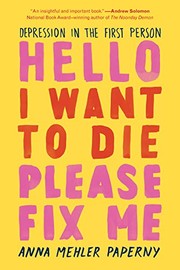Please Fix
3 stars
Content warning sui
1) "No one wants this crap illness that masquerades as personal failing. I had no desire to plumb its depths."
2) "The myth of the mad creative genius makes for good narratives but in my experience it's a myth. I know brilliant people who have mental illness but the latter is a bug, not a feature. Psychic torment punches you in the face and crowbars you in the knees; it doesn't make you Mensa magic. Maybe some lucky nutbars have the productive-creative-brilliant brand of crazy. But the only reason it seems an inordinate number of artsy genius types are crazy is because you never hear from us normal crazy people. All those tortured brainiacs are far outnumbered by poor fuckers who're just tortured. Mental illness made me incurious, inert. I retreated into myself. I struggled to write."
3) "Again and again, people I've spoken to bring up their sense of isolation, that theirs is a personal flaw unique to themselves, not something faced by others, certainly not something fixable. Debilitation – that inability to get out of bed, to interact with people – fuels self-revulsion. I loathed myself for the endless stasis, projects unrealized and opportunities ungrasped. I felt I was expending all my energy on the most basic level of functioning and had nothing to show for it – just years of going through the motions. And the worse I felt, the less motivated I was to pursue treatments that felt ineffectual."
4) "Depression is not sexy enough for the spotlight. A major reason we neglect depression – even more than we neglect other psychiatric illnesses – is because the most devastating disease in the world, in terms of total disease burden, lacks that certain je ne sais quoi."
5) "In a 2009 study researchers showed an Atlantic salmon a series of photographs of humans in various social situations. The salmon was asked to determine what emotion the person in the photo was experiencing. The salmon was dead."
6) "The most strident, consistent, compelling objections to psychiatry in general and depression in particular – the science is perceived to be a sham; the treatment is seen as harmful and coercive – are rooted in legitimacy. Industry and clinicians have overstated depression drugs' efficacy and oversimplified the way depression works. There are side effects to all medical interventions, some more serious than others. People with mental illness or people believed to have mental illness are hospitalized and treated involuntarily. But none of this means that depression isn't a real, debilitating illness. Depression is a genuine and genuinely awful condition; we just don't understand it. Drugs, psychotherapy, electroconvulsive therapy, repetitive transcranial magnetic stimulation, exercise, all work on some people to some degree. Depression's treatment toolbox remains inadequate."
7) "It started in Grade 9. He became lethargic, lost energy. Fixated on a growing list of his own shortcomings, things he needed to fix within himself to make everything better. Learned to cope with a subsuming sense of worthlessness by retreating into mental haze. 'I was kind of out to lunch,' he says. 'Normal situations gave me anxiety. So I avoided them.'
That fog makes it hard, even now, for him to recall specific events in his past. It's like he's straining to observe the details of someone else's dream. Chronic mental illnesses mess with both the way you perceive your world and your ability to recall it later. Many of my more intrusive personal interviews for this book were exercises in frustration as I prodded people to recall episodes distorted by cognitive biases and glitchy memory systems."

